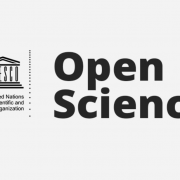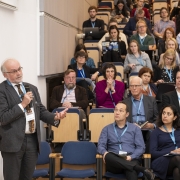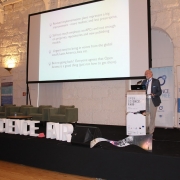The open access initiative Plan S has rekindled the debate on the future of open access and pushed the European research community to renew its commitment to a transition towards a fully open science system. ALLEA joined the discussion with the expertise of its working groups and elaborated an initial response to shift the focus of the initiative for the benefit of science and society. The debate is far from close and many ethical, legal and disciplinary considerations are still on the table. We asked ALLEA working groups’ chairs about some of the most relevant aspects of the future of open access.
We need to look at more than sticks and carrots – an analysis of conditions and infrastructures promoting high quality research is essential.
Göran Hermerén, Chair of the ALLEA Permanent Working Group Science and Ethics
Question: The past year has seen some great strides in the advancement of open access. Your working group has contributed both to addressing ethical considerations in general as well as those within Plan S. Do you think that we are now on the right path to achieving a good, ethically fair system of open access?
Göran Hermerén: Yes, on the whole. But more work on the implementation of open access remains to be done – including comprehensive dialogue with different stakeholders. This will take some time, but it is important, since the challenges, needs and publication habits vary among various disciplines. Care must be taken that countries and research institutions with less economic resources are not disfavoured. The role of the funding agencies is crucial, since they can impose conditions for their financial support of research projects.
Q.: ALLEA’s response to Plan S stressed the need for a corresponding reform of the research evaluation system. Where do you stand on this issue and what do you think is important to consider in any such reform?
G.H.: At our next meeting we will plan an activity focusing precisely on this. In the evaluation of research performance it is important to consider not only commonly used metrics that are thought to drive poor behaviour, such as journal impact factor, citation rates or even just numbers of publications, but take a broader view of approaches and incentives that could be used to promote research integrity and good scientific practice. Some metrics are required but these will need to be supplemented by other considerations such as the quality of the research (idea or output) and its potential to have beneficial societal or economic impacts in the longer term. The San Francisco DORA declaration is an important document in this debate. This also means we need to look at more than sticks and carrots –an analysis of conditions and infrastructures promoting high quality research is essential.
In the answers to both questions it will be important to keep an eye on unintended consequences of well-meaning proposals, and realise that what may work or even work well in one country or discipline might not work (or work well) in others.
Natalie Harrower, Chair of the ALLEA Working Group E Humanities
Question: While Plan S is putting a focus on open access to scientific publications your working group’s activities also include the broader context of open science and open data. What principles do you recommend should be followed here and how could they best be implemented?
Natalie Harrower: The movement towards greater openness, transparency, and widespread access to scientific research and the multiple products of that research has been grouped under the broader concept or movement known as ‘open science’. In terms of research transparency, integrity, acceleration and the democratisation of access to knowledge, open science as a movement is nothing less than revolutionary, and it should be broadly welcomed and supported at all levels.
Alongside the movement towards open access to scientific publications is the movement towards opening access to the research data that enables the findings detailed in these publications. Researchers should now turn their attention to following the FAIR principles (Findable, Accessible, Interoperable, Reproducible) in data management, and seek guidance on how to create a data management plan (DMP) as early as possible in the research process (i.e. when preparing grant applications, or before undertaking a new programme of research). Researchers, and research support staff, should make themselves aware of any national policies on open science/open research/open scholarship, and can turn to funding agencies, research offices, academic libraries, or European sources for specific guidance. Umbrella organisations working to support and enable better research data sharing include the Research Data Alliance, CODATA, and Science Europe.
Researchers should now turn their attention to following the FAIR principles in data managament, and seek guidance on how to create a data management plan as early as possible in the research process.
Joseph Straus, Chair of the ALLEA Permanent Working Group Intellectual Property Rights
Question: Open access may generate conflicts with some aspects of the patenting system. One of the recommendations of the ALLEA Permanent Working Group Intellectual Property Rights refers to the need to adopt a grace period in Europe. Why is such a measure necessary and how should Plan S take into account this demand?
Joseph Straus: It may first be recalled that under the European Patent Convention and the patent laws of the EU Member States novelty destroying state of the art is everything which has been made available to the public in any way prior to the filing of the patent application. In other words, also own publications of the inventor him/herself constitute such a prior art.
In a number of countries, such as Australia, Argentina, Brazil, Canada, Japan and the United States, to name but a few, the institute of a so-called grace period exists, which enables the inventor, or his/her successor in title, to apply for a patent within a certain period of time (six or twelve months) from the publication date and enjoy immunity against their own publications.
Although all inventors and their research institutions have to be careful in allowing publication of research results prior to the filing of a patent application, inventors, especially from academic institutions, publish their research results without an adequate control as regards their patentability and potential commercial exploitation, and thus deprive themselves and their employers, eventually also the tax payers in case of publicly funded institutions, of any property rights in such research results.
Since the Plan S puts pressure on early publication of research results, the lack of grace period in the European patent law (s) will obviously aggravate the situation of European scientists/researchers and put them at even greater disadvantage as compared with their colleagues overseas.
ALLEA has since the 1990s repeatedly, but in vain, advocated in favour of an introduction of a grace period in the European Patent Convention and the patent laws of the EU Member States. For that purpose representatives of ALLEA met even the responsible EU Commissioner, and on different occasions also other representatives. It should be emphasised that because of intricacies of patent law, often, even a timely filed patent application does not adequately protect the inventor and his/her research institutions as regards the follow-on research.
In any case, a prudent handling of publication activities results, on the one hand in some delay of publication and still does not offer the necessary legal certainty. Since Plan S evidently puts pressure on early publication of research results and on open access to them, the lack of a grace period in the European patent law(s) will obviously aggravate the situation of European scientists/researchers and put them at an even greater disadvantage as compared with their colleagues overseas.
This interview was originally conducted for and published in ALLEA’s Annual Report 2018/2019
 The aim of the UNESCO Recommendation is to provide an international framework for open science policy and practice that recognises disciplinary and regional differences in open science perspectives, takes into account academic freedom, gender-transformative approaches and the specific challenges of scientists and other open science actors in different countries and in particular in developing countries, and contributes to reducing the digital, technological and knowledge divides existing between and within countries.
The aim of the UNESCO Recommendation is to provide an international framework for open science policy and practice that recognises disciplinary and regional differences in open science perspectives, takes into account academic freedom, gender-transformative approaches and the specific challenges of scientists and other open science actors in different countries and in particular in developing countries, and contributes to reducing the digital, technological and knowledge divides existing between and within countries.










